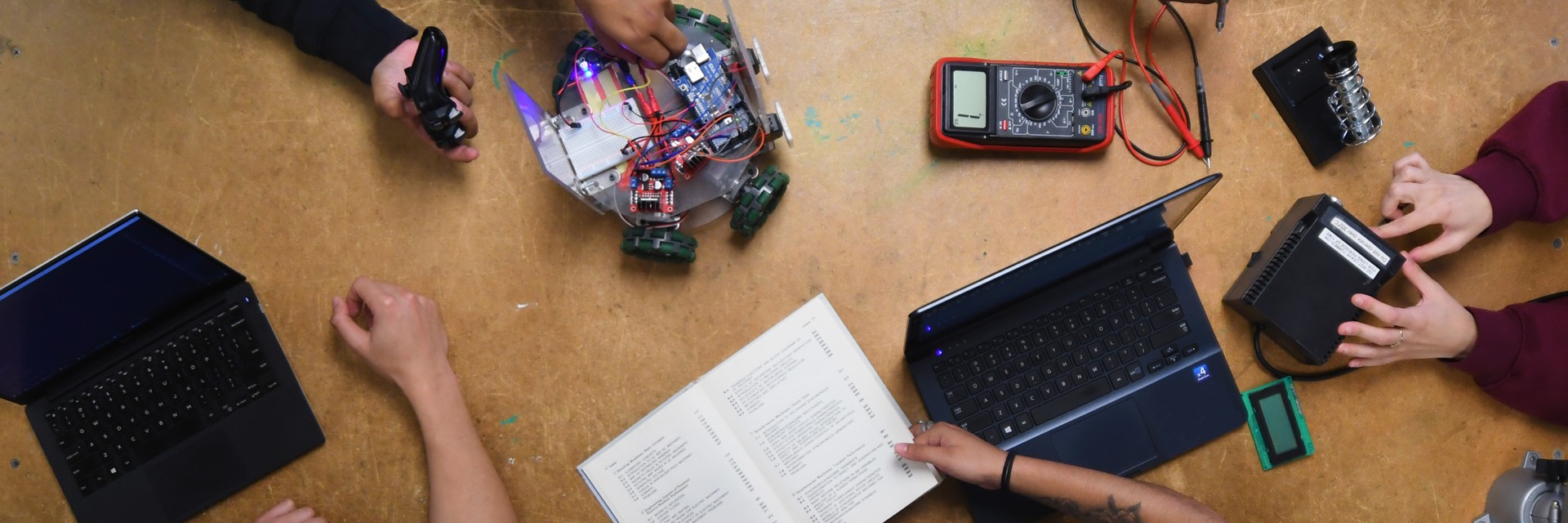Rehabilitation Engineering Special Options Courses
Required Courses (15 units)
Upper Division Kinesiology Required Courses (9 Units)
Upper Division Rehabilitation Requirements (12 units)
General Science Electives (4 units)
Upper Division Technical Electives (8 Units)
Required Courses (15 units)
All following courses must be completed
BIOL 100A Introductory Biology I (5 units)
Prerequisites: None.
Introduction to the ecology, evolution and diversity of life, covering all major
groupsof organisms from a phylogenetic perspective
BIOL 200A Human Anatomy and Physiology I (5 units)
Prerequisite or corequisite: CHEM 151
Structure and function of the cell and tissue; anatomy and physiology of the skeletal, muscular, digestive, and urinary systems. No credit toward biology major or minor.
BIOL 200B Human Anatomy and Physiology II (5 units)
Prerequisite: BIOL 200A
Anatomy and physiology of the cardiovascular, respiratory, nervous, endocrine, and reproductive system. No credit toward biology major or minor.
Upper Division Kinesiology Required Courses (9 units)
All following courses must be completed
KIN 335 Anatomical Kinesiology (4 units)
Prerequisite: BIOL 200AB
Structure and function of the musculoskeltal system in relation to human movement.
KIN 340 Applied biomechanics (5 units)
Prerequisite: MATH 102, MATH/ECON 109: PHYS 156 and BIOL 200B. Prerequisite or Corequisite: KIN 310
Analysis of anatomical and mechanical bases for efficiency of human movement.
Upper Division Rehabilitaion Required Courses (12 units)
All following courses must be completed
ME 250 Biomaterials (4 units)
Prerequisite:
ME 350 Biomaterials (4 units)
Prerequisite:
ME 454 Special topics in Mechanical Engineering (4 units)
Prerequisites: senior standing in mechanical engineering; enrollment subject to approval of instructor in charge
Group study of selected topics not currently offered as technical electives, study groups may be organized in advanced mechanical engineering subjects upon approval of instructor. May be repeated for credit.
General Science Elective (4 units)
Select at least 4 units from the following list of classes
CHEM 102 General Chemistry II (5 units)
Prerequisite: CHEM 101
Structure of molecules, states of matter, acids and bases, equilibrium, oxidation-reduction, electrochemistry, coordination compounds.
BIOL 300 Biometrics (4 units)
Prerequisite: grade of C or higher in BIOL 100C; MATH 103.
Statistical analysis applied to biological problems, with emphasis on sampling, experimental design, chi-square analysis, t-test, analysis of variance, regression analysis, and correlation analysis.
BIOL 435 Neurobiology: Neuroanatomy (4 units)
Prerequisite: BIOL 380
Gross and microscopic structure of the mammalian nervous systems, organizational aspects classical lesions and deficits
KIN 360 Physiology of Exercise (4 units)
Prerequisite: Math 102, Math/Econ 109; and BIOL 200B. prerequisite or corequisite: KIN 310.
Analysis of physiological bases of effect of movement and stress on human organism; factors affecting conditioning.
KIN 436A Principles in Mobility Training (4)
KIN 425 dimensions of kinesiology for individuals with disabilities (4 units)
Prerequisite: KIN 250; Prerequisite or Corequisite: KIN 310
Submission of a certificate of clearance to school of kinesiology and nutritional science for students completing the physical education single subject teaching options and, community leadership options. Conditions requiring special physical education including: learning disabilities, retardation, neurological and orthopedic conditions.
KIN 436A Principles of Mobility Training (4 Units)
Prerequisite: BIOL 200A, BIOL 200B, and concurrent enrollment in KIN 436B
Introduction to mobility training techniques such as range of motion, flexibility, manual resistance
exercises, posture, balance and gait training
KIN 436B Mobility Training Practicum (2 Units)
Prerequisite: KIN 436A (or concurrent enrollment in KIN 438A)
Application of mobility training to physically impaired clients. May be repeated for a maximum of 12 units. Service learning is required.
KIN 437 Disease and Plasticity in Neuromuscular Systems (4 Units)
Prerequisite: Upper division standing
Introduction to neuromuscular diseases and exercise-induced plasticity in neuromuscular systems.
KIN 456 Sport and Exercise Ergogenic Aids (4 Units)
Prerequisite: KIN 360
Relevant issues in ergogenic aids and sport. Pharmacological and hormonal aids: dietary requirements and issues of individuals who engage in exercise and sport.
KIN 460 Principles of Physical Fitness Assessment
Prerequisite: KIN 360
Physical fitness and performance assessment techniques employed within the laboratory environment: electrocardiography, electromyography, closed, and open circuit, indirect calorimetry, stress testing,
hydro densitometry, respirometry and cardio circulatory.
KIN 461 Advanced Exercise Physiology (5 Units)
Prerequisite: KIN 360
Advanced topics in exercise physiology, including exercise responses, in the neuroendocrine, cardiopulmonary, immune, and skeletal systems. Topics will also include system-level integration during exercise, and exercise in stressful environments.
Kin 485A Practicum in Exercise and Human Performance (2
Units)
Prerequisite: KIN 465
Directed on-campus practicum in a career related setting. Regular conferences with supervisor. Total 100 hours. Graded CR/NC
Upper Division Technical Electives (8 Units)
Select at least 8 units from the following list of classes
ME 306 Heat Transfer I (4 Units)
Prerequisites: MATH 208, PHYS 212
Fundamental principles of heat transfer; conduction, convection, and radiation; applications.
ME 321 kinematics (4 Units)
Prerequisite: ME 319
Transmissions of motion; theory of mechanisms; linkages; gears; cams; belts and chain.
ME 409 mechanical engineering analysis (4 Units)
Prerequisite: MATH 215, and senior standing
Setup of vibration,heat transfer, fluid flow, and other mechanical engineering systems as ordinary and partial differential equations; analogies between various physical systems. Classical, transform, numerical, and computer-aided methods of solution.
ME 410 Control of Mechanical Systems (4 Units)
Prerequisites: MATH 215, ME 306, PHYS 213
Mathematical models of dynamic systems, fundamentals of feedback control, basic control actions and devices, applications to mechanical systems.
ME 414 Machine design (4 Units)
Prerequisites: ME 323
Design of unit assemblies and machines; materials, safety, lubrication, and construction
ME 419 computer aided mechanical engineering (4 Units)
Prerequisites: ME 103, ME 323, ME 303, ME 306, CS 290(or equivalent)
Applications of modern engineering tools in computer- aided design, finite element analysis, computational fluid dynamics and control simulations. Problems in mechanics, heat transfer, fluid dynamics, and control, etc. are covered
ME 421 Dynamics of Mechanisms (4 Units)
Prerequisites: CE/ME 320
Application of principles of statics, kinematics, and dynamics to analysis and design of mechanisms with rotating or reciprocating
ME 422 optimization of mechanical design (4 Units)
Prerequisites: MATH 215, ME 306, PHYS 213
Design considerations of mechanical engineering systems; optimization techniques; application of existing computer programs and analytical methods to optimization of mechanical engineering systems.
ME 423 introduction to finite element method (4 Units)
Prerequisites: CE/ME 210, CS 290, MATH 215. Corequisites: ME 306, ME 323
Derivation of element stiffness matrices for spring, bar, beam, and constant-strain, triangle elements, from energy principles. Application to trusses and frames. Steady-state heat transfer. Use of finite element method software.

